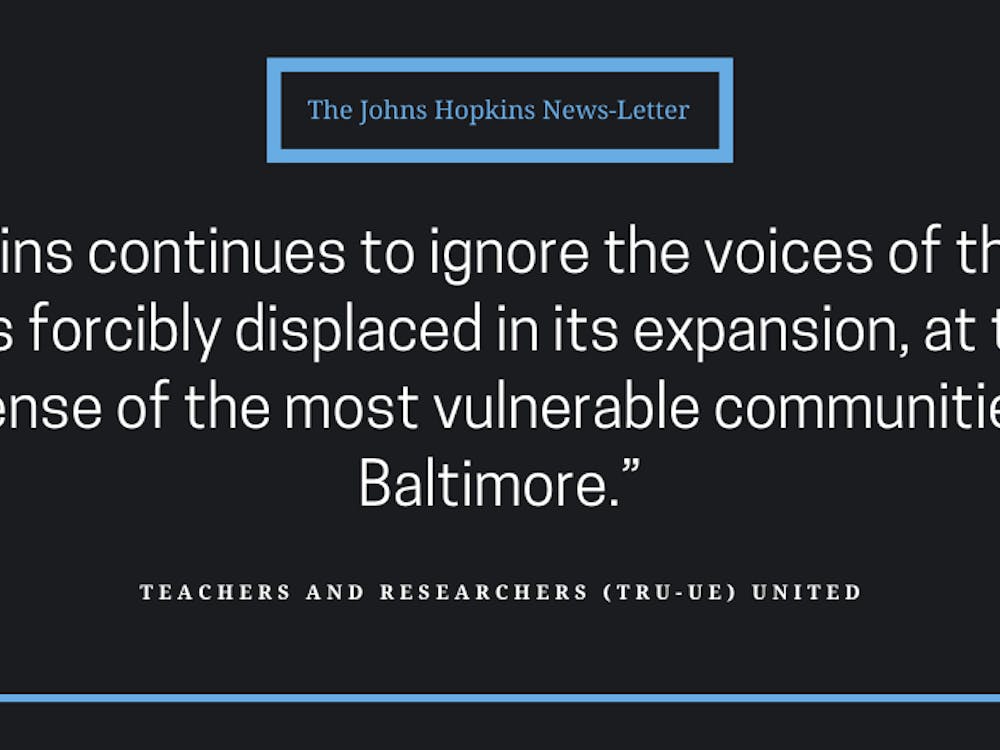The Black Student Union (BSU) held a protest on Thursday in response to the fatal shooting of Michael Brown, an African American 18-year-old, by white police officer Darren Wilson in Ferguson, Mo. on Aug. 9.
The silent and peaceful protest started in the Upper Quad near Gilman Hall with demonstrators of varying races and ages. Hopkins students and professors stood alongside Baltimore citizens and held up protest signs.
The BSU’s signs included statements such as “Black Lives Matter,” “Would You Shoot Me?” and “Martin Didn’t March For This,” referring to Martin Luther King, Jr. One sign also read “Hands Up, Don't Shoot,” which has become a slogan for Ferguson reactionary protests across the country and refers to that fact that Brown had his hands up when Wilson shot him.
“We hope what we do here will speak louder than words,” BSU member senior Tierra Langley said.
Protesters circled the quad slowly, and many passing Hopkins students stopped to read the signs and ask questions.
“The protest brings awareness to the world right here from JHU. [The] focus here often gets lost,” junior Dan Adler said.
There was a police presence of eight Baltimore police officers on campus and on N. Charles Street, as well as several campus security personnel clumped near the demonstrators. An approached officer stated that he was not allowed to comment on the protest.
Once the protesters arrived at N. Charles Street, they lined up along both sides of the median, standing in silence and showing their signs or their raised hands to passing drivers and students. A man told his own story of police brutality, where the officer beat him and got away without reprimand. Some passing students whispered about the protest, and many others took pictures as the protesters continued to stand.
Before the protest, sophomore BSU member Tiffany Onyejiaka said the main message of the protest was that all lives matter.
“People should not have their lives ripped away for reasons that are unjustifiable,” Onyejiaka said. “People don't realize that it wasn’t an isolated event. Even since [Brown’s] death there have been many incidents of police brutality. We are protesting for people of all races who have been killed or brutalized by the police for reasons that aren’t really justifiable.”
She also said that police brutality and militarization is not just a problem for minorities, but is a relevant issue for all Americans, especially in cities like Baltimore.
“The police have been militarized lately, and especially to people of color and in low income areas they tend to be more aggressive,” Onyejiaka said. “We are trying to bring attention to the fact that this is something we need to talk about. Mike Brown shouldn’t have died. People who jaywalk shouldn’t die. If you steal a candy bar from a store, you don't deserve to die. [Wilson] still hasn’t been arrested or questioned, and that Mike Brown’s body was left for four or so hours after his death.”
Onyejiaka said that not only is racism is still around today, but it is a force that isn't going to go away anytime soon.
“If you say racism doesn’t exist, then you just don’t want to pay attention to racial inequalities,” Onyejiaka said. “Even at Hopkins I’ve heard people say things and seen people do things that are [racist]. Open your eyes and pay attention.”
Senior BSU member Phil Montgomery said that the protest was silent because of organizational purposes to keep the protest more manageable.
“We want to keep the focus on the message and the signs,” Montgomery said.
BSU faculty advisor Katrina Bell McDonald said that the group was moved by the events in Ferguson and wanted to express their thoughts publicly.
“[The BSU members] need to let the community know that they are concerned. The protest was to stimulate the interests on campus,” McDonald, a sociology professor, said. “Our primary concern is to ensure that people know that we are very concerned about this issue and that there are African American men [at Hopkins] that are the same age as those who die [in Ferguson and elsewhere].”
McDonald also said that she hopes the protest will spark introspection and debate about race and the relationships between the police and the communities they serve.
“I want to get people thinking about how we are making change,” McDonald said. “Some of that change has to be on part of the police department and some on part of the community. This could be the beginning of our conversation here at Hopkins.”






















Please note All comments are eligible for publication in The News-Letter.